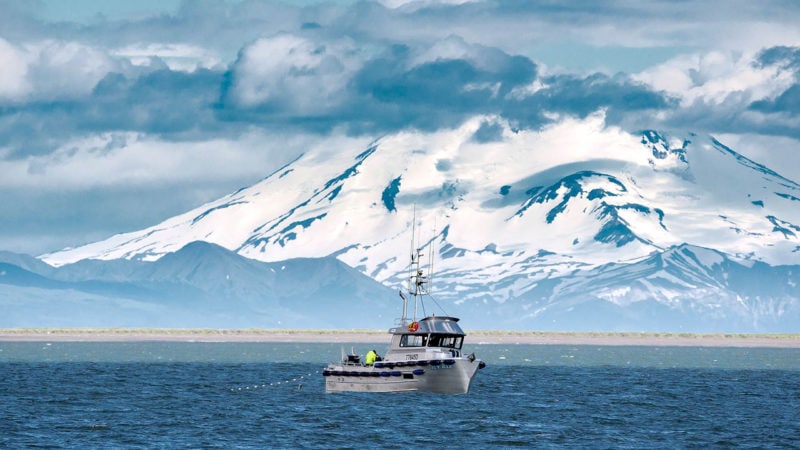Last Updated on February 23, 2023
For more than a decade, the pristine waters of Bristol Bay, Alaska – where we source our salmon – have been under the threat of proposed mining activity that would effectively destroy the ecosystem. ButcherBox has been one of a multitude of parties, led by Indigenous peoples, fishermen, businesses, and activists from the Bristol Bay region, that have spoken out against the proposed mining activity. One group that has organized these collective voices in support of the Bristol Bay ecosystem is Trout Unlimited, is a U.S. non-profit dedicated to the conservation of freshwater streams, rivers, and associated upland habitats for trout, salmon, other aquatic species, and people.
At the end of January, the EPA released a final determination under the Clean Water Act restricting the proposed mining activity in Bristol Bay. In celebration of this decision, we caught up with Meghan Barker, a Bristol Bay organizer for Trout Unlimited, to learn more about the impact of this action and how Trout Unlimited’s fight to protect the Bristol Bay watershed continues.
Tell us a bit about Trout Unlimited’s mission and work in Alaska?
In Alaska, Trout Unlimited is committed to keeping streams clean, cold and fishable, and engaging communities to be good stewards of their nearby rivers. We support the conservation of some of the most prolific trout and salmon systems, like Bristol Bay and the Tongass National Forest in southeast Alaska, that face large scale challenges like industrial mining and deforestation. Additionally, we facilitate restoration work to revive critical fish habitat at a local scale. We work with diverse partners across the natural resource industry in Alaska to ensure that these incredible fisheries can continue to stay wild and support the Alaskan way of life.
How long has Trout Unlimited been involved in conservation work in Alaska and the effort to Protect Bristol Bay?
Trout Unlimited has been working in Alaska for over 15 years and stepped up alongside Tribes and commercial fishermen in 2010 when Clean Water Act 404© safeguards were officially requested. We’ve been engaged in the effort to permanently protect the region by stopping the formerly proposed Pebble mine from getting its key federal permit in 2020, as well as leading litigation efforts during the last 13-year fight for Clean Water Act safeguards. Trout Unlimited’s work in Bristol Bay won’t cease until we have durable, permanent protection for the entire watershed.
What makes Bristol Bay unique and what is at stake if Pebble Mine were to be built?
Bristol Bay is truly like no other place on the planet. The sockeye run alone continues to smash records, with 70+ million fish running through the region’s rivers this past summer (2022). While other fisheries are struggling in Alaska, Bristol Bay continues to be the shining light of success. It’s a world class fishery that has been maintained for generations by the Indigenous Peoples of Bristol Bay, who are still here and whose cultures revolve around salmon. The Pebble project would essentially hit Bristol Bay in its heart and turn the region into an industrial mining complex. History and science have clearly shown that a hard rock open-pit mine cannot coexist without damage to the fishery and local water resources. Pebble would forever ruin everything that makes Bristol Bay a unique place.
What’s happened recently in the effort to protect the bay?
On January 30, 2023, the U.S. Environmental Protection Agency announced a final decision on Clean Water Act 404© safeguards for Bristol Bay. After many years of scientific analysis and seven public comment periods, EPA’s protections restrict mine waste discharge in the Pebble deposit area of Bristol Bay, effectively blocking Pebble’s 2020 mine plan from being able to happen in the future. These protections are monumental because the people of Bristol Bay have been asking for them for over a decade. While they offer another layer of protection against the formerly proposed Pebble mine, we still need watershed-wide safeguards to ensure Pebble, or another mining company, cannot return in the future.
How do you talk about what’s happening in Bristol Bay to someone who has never heard of this fight?
I try to paint a picture of Bristol Bay – it’s a place with untouched landscape that goes on for miles and miles and has gin-clear streams that run red with wild sockeye salmon in the summer. It brings life to the region that is home to some of the kindest people I’ve ever met. And there’s a dark cloud looming over the area with a goal for development that would destroy everything that’s been built and maintained by the fishery. The formerly proposed Pebble mine got too close to becoming a reality in the headwaters of Bristol Bay; our work now is to make sure Pebble, or another mining company, cannot build an industrial mining district in the heart of wild salmon country. We aren’t opposed to all mining, but we are opposed to mining in this critical and unique place. No Pebble mine. Not here. Not ever.
What do you attribute to the success of TU and its partners to protect the bay?
Our greatest success came from finding common ground in our commitment to Bristol Bay with people who come from very different backgrounds. Commercial, sport and subsistence anglers tend to butt heads on various issues in Bristol Bay; a united front against Pebble brought people together and showed just how much of an overwhelming opposition there was to the mine. Showcasing the support for Bristol Bay that exists across the political spectrum also assisted in our efforts to ensure Pebble couldn’t advance in the region.
What do you expect to happen next? Is the fight over?
Unfortunately, we expect the Pebble Limited Partnership and its allies to sue the EPA for this great decision. If litigation ensues, Trout Unlimited is committed to defending the protections in court alongside EPA. That is likely the most immediate thing we will see.
Despite this major win, the fight is far from over. Watershed-wide protections are the ultimate thing that will allow us to say “Bristol Bay is safe.” The mineral leases in the Bristol Bay region must be retired, which can happen through legislation on the federal and state level. Following the leadership of local people in Bristol Bay to design a future that they want for their communities, we are still assessing the next steps and what exactly the best path forward will look like. Bottom line: Bristol Bay is not safe yet.
Looking Ahead
We share the same excitement that Meghan and the Bristol Bay communities’ have about this decision, but also acknowledge that challenges to Bristol Bay’s watershed and other wild places that support wildlife, community livelihoods, and our food system will continue. That’s why we’ll continue to support Trout Unlimited and the efforts of other organizations that focus on protecting and regenerating ecosystems so that animals, communities, and the planet can rely on them in the future.
One way to ensure the longevity of critical ecosystems is to raise awareness of the beauty that is at risk. Meghan said it best when she summed up her team’s work, “We’ve helped shine a light on a place that already speaks for itself and is more than worthy of permanent protection.” Through our very own short film, “Forever Wild”, ButcherBox has tried to raise awareness of the undeniable beauty that is Bristol Bay,
We’d be remiss in not acknowledging our incredible salmon sourcing partners, Matt and Meghan Luck, for making the introduction to Trout Unlimited for us so that we could support their conservation work and join in on the fight to protect Bristol Bay these last several years.
If you’re interested in learning more about Trout Unlimited’s continued work to Save Bristol Bay, check them out on Facebook and Instagram, and, if you have the ability to make a contribution, you can donate to the Save Bristol Bay project.
Kelly Hilovsky is the Senior Manager of Social and Environmental Responsibility at ButcherBox. She has an MPH from Johns Hopkins and is committed to addressing complex social problems through the lenses of public health and food justice.



